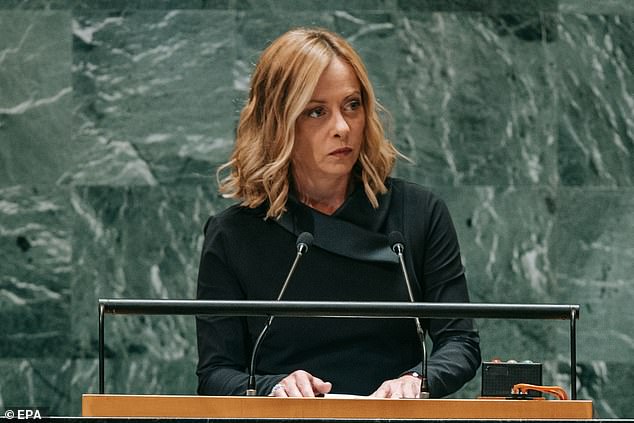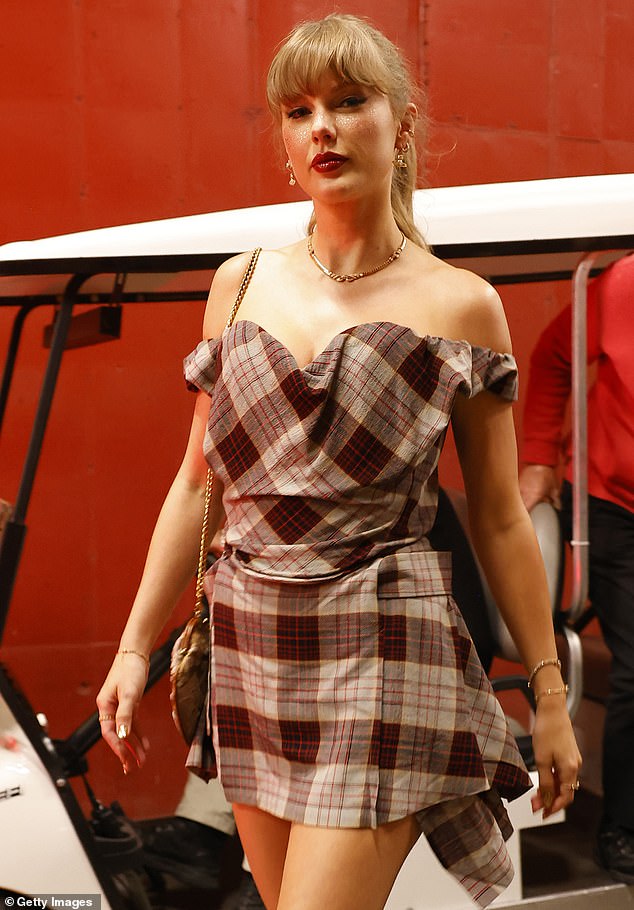Giorgia Meloni tells court deepfake porn videos of her are ‘a form of violence against women’ as she demands those responsible are punished
- A father and son are accused of creating a deepfake of Meloni
Italian Prime Minister Giorgia Meloni has condemned deepfake porn videos as a “form of violence against women” as she appeared in court to demand punishment for the two men who allegedly made fake explicit videos of her and shared them online.
The 47-year-old, who appeared in court via video link from Rome on Tuesday, said: “I insist on demanding the punishment of those responsible because I find what they have done intolerable.” according to Italian news channel Ansa.
‘This is a form of violence against women. It’s unbearable in terms of the feeling these images gave me.
Allessio Scurosu, 40, and his father Roberto, 74, from Sardinia, are accused of making a deepfake video featuring Meloni and sharing it with US porn websites.
Prosecutors said the footage, taken in 2020, has been viewed millions of times.
Italian Prime Minister Georgia Meloni appeared in court via video link yesterday to seek damages from a father and son who made fake pornographic videos of her in 2020

Italy’s leader said deepfake porn videos are a ‘form of violence against women’ and has called for stricter rules around AI-generated images
Meloni, who filed a defamation lawsuit against the father and son earlier this year, is asking for 100,000 euros (or £84,000) in damages, which she plans to donate to a fund to help female victims of domestic abuse.
Her lawyers had previously said the prime minister’s reason for pursuing the case was to “send a message to women who are victims of this type of abuse of power, not to be afraid to report it.”
The politician also expressed concerns on Tuesday about how artificial intelligence can be used to produce images that appear real.
Deepfakes are AI-generated media that mimic human voices, images and videos that can be mistaken as real.
“If, with the advent of artificial intelligence, we superimpose one woman’s face on another woman’s body, our daughters will end up in these situations, and that is exactly why I think it is legitimate to wage this war,” Meloni said.
She also noted that she believed there should be stricter laws surrounding deepfakes.
Meloni isn’t the only public figure to have explicit deepfakes made and shared online for millions of people to see.
Female celebrities have been the main targets of deepfake images since Natalie Portman was featured in a video in 2018.

It comes as sexually explicit deepfake images of singer Taylor Swift went viral earlier this year

Harry Potter star Emma Watson also featured in an explicit deepfake advert on social media this year
Marvel actress Scarlett Johansson was also targeted last year when a deepfake video advert promoting Lisa AI surfaced.
Earlier this year, pornographic deepfake images of singer Taylor Swift went viral on social media after amassing more than 27 million views and 260,000 likes before being taken down.
In March, Harry Potter star Emma Watson was featured in a deepfake ad on social media in which she appears to perform a sex act.
The controversy surrounding Meloni’s fake porn comes as more than 400 AI experts, celebrities, politicians and activists signed an open letter earlier this year demanding that lawmakers regulate the use of generative AI technology to create deepfakes.
The letter, titled ‘Disrupting the Deepfake Supply Chain’, argues that the growing number of AI-generated videos pose a threat to society due to the involvement of sexual images, child pornography, fraud and political disinformation.
It also states that deepfake technology deceives the public, making it harder to discern what is real on the internet, and that it is therefore more important than ever to implement formalized laws “to protect our ability to recognize real people.”
